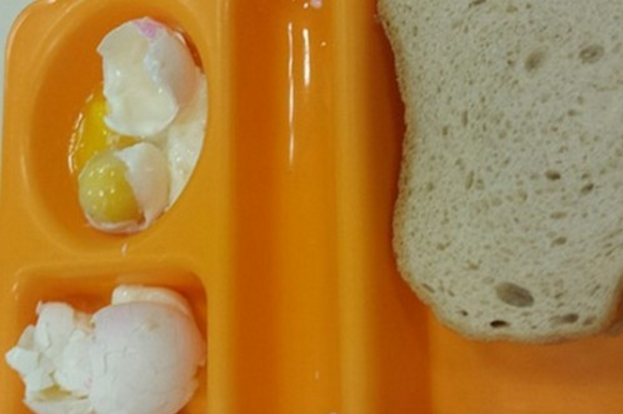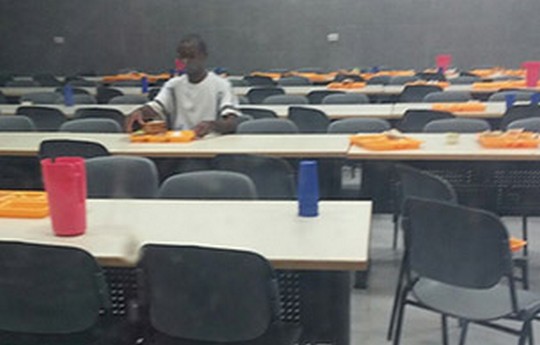Asylum seekers have long complained about the half-cooked food in Israel’s Holot detention center.

African asylum seekers held in Israel’s Holot detention center staged a walkout from the cafeteria on Saturday night to protest the half-cooked food served at the facility.
The asylum seekers walked out just as dinner was being served, instead deciding to congregate outside the cafeteria. Only one detainee remained inside. Detainees at Holot have long complained about the food, which they claim is inedible. The daily menu in Holot includes hummus, tuna, four slices of bread and an uncooked egg.
T.G.A., one of the asylum seekers in Holot describes the motive for the walkout: “Generally our dinner includes bread, hummus, an egg, and rice. Once a week we get tuna instead of rice. Most of the time the egg and the rice are not cooked. There is no one in the cafeteria we can complain to. This time when we saw that the eggs weren’t cooked, we decided to complain to the guards, who told us that it wasn’t their problem. This is the response we generally receive, so we decided to stage a walkout over the quality of the food. Only one person remained and ate his dinner.”
According to a report published last summer by the Hotline for Refugees and Migrants, the food served to detainees in Holot does not meet their basic nutritional needs. “When the Holot facility fails to provide adequate nutrition options, and the detainees are not given enough money to buy food outside of Holot, a very real food insecurity problem is created,” public health researcher Megan Cohen wrote in the report. According to the report, the three meals served daily include empty carbohydrates, such as white rice. Most days the only source of protein is a single hard-boiled egg and a small box of cheese.
Israel Prison Service responded to the accusations as follows: “There is and never was a problem with the amount or quality of the food in Holot. Specific problems, which arise in other places, are taken care of immediately, while ensuring that no one is left without food.”
Asylum seekers living in Israel are in constant threat of being jailed for long periods of time at the Holot detention center, located near the Egyptian border, and which the Israeli government presents as “open” center where detainees can come and go as they please, as long as they report to roll call once a day. The detainees have repeatedly complained of being stuck in the middle of the desert and of having no way of getting to work or studies.
In June Israel’s High Court of Justice approved the latest version of the “anti-infiltration law,” which allows the state to imprison asylum seekers in Holot for a period of a year. Recently appointed as Israel’s interior minister, recommended last week that the government honor the High Court decision.
According to Deri the law will pass its second and third readings by February 10, the date ordered by the High Court.
This article was written along with ‘News from Holot,’ comprised of asylum seekers in Holot who are taking part in a photography course taught by Activestills’ Oren Ziv and Keren Manor, as well as ‘Ben-Gurion Students for Refugees and Asylum Seekers’ at Ben-Gurion University. It was first published in Hebrew on Local Call — read it here.



